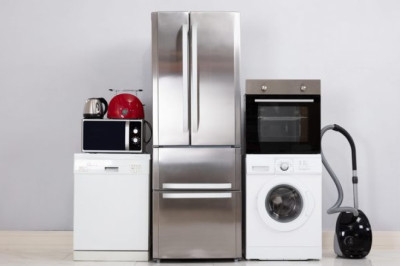UAE FROZEN FOOD MARKET SIZE PROJECTED TO GROW AT A CAGR OF 4.9% DURING THE FORECAST PERIOD 2021-2026
views

UAE Frozen Food Market size was estimated at $8.9 billion in 2020, projected to grow at a CAGR of 4.9% during the forecast period 2021-2026. As United Arab Emirates is unfavorable to most kinds of agriculture due to its dry environment and little rainfall, the frozen food business in the UAE has seen a surge in demand. As a result, the UAE relies significantly on food imports. The market’s rise is being fuelled by an increasing need for convenience foods like refrigerated soups, frozen snacks, frozen meat and others that is being accelerated by factors such as busy lives, evolving customer tastes, and a rising demand for ready-to-eat foods. Because of the huge number of expats and foreign employees in the region, demand for frozen meat such as seafood has increased and it is a key factor pushing up demand for imported fisheries goods. There is a lot of demand for halal seafood products. Following the onset of COVID-19, the frozen food industry has performed well. The idea that frozen food items can keep their nutrient content for a long time, reducing the amount of times customers must visit a store or outlet, is also beneficial to the industry. While COVID-19 had a considerable effect on the cold chain supply, changing customer purchasing habits, with a greater emphasis on health, have aided the frozen food market’s development sooner than predicted. However, as people become more health-conscious, their demand for fresh and natural foods has grown. This will cause the demand to expand more slowly throughout the forecast era.
UAE Frozen Food Market Segment Analysis – By Product Type
Based on Product Type, UAE Frozen Food market is segmented into Frozen Fruits, Frozen Vegetables, Frozen Potatoes, Frozen Meat, Frozen Seafood, Frozen Desserts, Frozen Snacks, Frozen Bakery Items, Frozen Ready Meals, and Frozen Soups. Frozen Ready Meals is accounted for the largest revenue market share in 2020 as it is a convenient alternative to cooking, and as a result, they are becoming increasingly popular among the working population as well as the growing expat population in the region. Customers in the market are showing huge interest for precooked and frozen dinners, such as frozen meatballs, veg dinners, and other frozen ready-to-eat foods that are halal certified, as a result of this factor, further boosting the entire market for frozen food in the region. Ta’moosh, one of the companies, has been supplying a large and high-quality assortment of frozen gourmet ready-to-eat Halal foods that appeal to a wide range of UAE clients and their hectic lifestyles. Frozen Bakery Items Segment is predicted to grow with the fastest CAGR of 5.3% in the forecast period 2021-2026. Middle Eastern countries such as Kuwait, the United Arab Emirates, and Qatar are among the world’s busiest, with a strong market demand for ready-to-eat foods. Frozen bakery products are reportedly imported as the country lacks a well-established domestic industry. This market is underserved, providing an opening for foreign corporations to penetrate the domestic market through the use of private labels. Hypermarkets and supermarkets, which are newer shopping models, are gaining traction among busy shoppers.
UAE Frozen Food Market Segment Analysis – By End User:
Based on End User, UAE Frozen Food market is segmented into Food Service, and Retail. Food Service segment is accounted for the largest revenue market share in 2020 owing to the fact that frozen meals like refrigerated soups, frozen meat, and frozen snacks are consumed in large quantities by the food service industry. Hotel chains, fast food supermarkets, cash & carry stores, caterers, and other business clients are also part of the food service industry. Furthermore, frozen food such as frozen meat, frozen snacks and refrigerated soups are becoming more common in the food service industry because it is processed and used for an extended period of time, lowering the maintenance costs. Furthermore, since they take less time to prepare and reduce customer wait times, fast food franchises and quick service restaurants are more common. Also, as internet penetration has increased and smartphones have become more available, more purchases have been made via online platforms. As a result, a number of fast food chains are shifting their focus to online portals in order to improve online food ordering, thereby boosting the product market’s growth. Retail segment is anticipated to grow with the fastest CAGR of 5.4% in the forecast period 2021-2026 as many people are too preoccupied with their jobs to devote much time to cooking or shopping for fresh recipes to cook with. Fresh products take much longer to prepare than frozen ingredients.
Request for Sample Report @ https://www.industryarc.com/pdfdownload.php?id=509578
Report Price: $ 5900 (Single User License)
UAE Frozen Food Market Drivers
Growing Demand for Convenience Foods:
Frozen food technology innovation and revenue continue to be driven by consumer demand for year-round access to fresh produce and ready-to-eat meals. Frozen ready meals, frozen meat, refrigerated soups, frozen snacks, and other frozen foods appeal to those who have busy lives and don’t want to spend a lot of time cooking whole meals. In addition, the region’s growing number of new supermarket formats, as well as the availability of a greater choice of frozen ready-to-eat meals, has attracted time-conscious shoppers searching for quick-to-eat meals, resulting in an increase in demand. Furthermore, western eating trends are gradually influencing the country’s customers. Furthermore, the increasing influence of western eating preferences among the country’s customers has boosted demand for packaged food. Strong urbanization, the emergence of a large number of expatriates, tourism, and young customers all contribute to the market for ready-to-eat, canned, refined, preserved, and frozen foods. Since frozen products take less time and effort than cooking from scratch, rising customer preference for prepared foods implicitly aids demand for frozen products. Because of consumers’ busy lives, the packaged food industry is motivated by a stronger demand for comfort. As a result, the market for frozen goods rises. Increasing disposable income is another aspect that has a significant impact on the frozen food market’s growth because it increases consumers’ purchasing ability.
UAE Frozen Food Market Challenges
Natural and Fresh Foods are Becoming Increasingly Popular:
One of the main constraints for this industry is the perception among some customers that frozen food is a poor replacement for fresh food. There’s a common belief that food processed a year or more before consumption isn’t healthy. However, comments from the US Food and Drug Administration (FDA) and the International Food Information Council (IFIC) regarding the nutritional quality of frozen food, such as “frozen produce can be almost as good as the fresh stuff in terms of nutrients,” are shifting customer perceptions. Vitamin C and folate are two nutrients that can change with time, and food products kept at different temperatures can lose their nutrients.
UAE Frozen Food Market Segment Landscape:
Product launches, mergers and acquisitions, joint ventures and geographical expansions are key strategies adopted by players in the Dried Blueberries Market. Dried Blueberries Market top 10 companies are Al Kabeer Group, IFFCO, Bellisio Foods, SIDCO FOODS TRADING COMPANY, McCain Foods, General Mills Inc., Wawona Frozen Foods, General Mills, Inc., ConAgra Foods, Inc. and Nestle S.A.
Acquisitions/Product Launches:
The CEO of Kraft Heinz Co. formally announced in March 2020 that the firm is working hard to close the demand supply gap caused by dramatic developments in the food industry.
Key Takeaways
The rising influence of western eating habits among the country’s customers has boosted demand for processed foods.
Furthermore, increased urbanization, the presence of a high number of expats, tourism, and young consumers would all drive demand for ready-to-eat, packaged, dry, preserved, and frozen items such frozen meat and snacks.
The demand for canned and frozen foods in the country is being driven by the rapid growth of cold chain delivery networks for frozen food in supermarkets and hypermarkets in the region. Frozen processed halal meat and poultry, cold beverages, and flavored milk are becoming increasingly common in the Middle East.
However, COVID-19 has sparked fear among shoppers, prompting immediate store closures in an effort to mitigate the virus’s effects. This has resulted in panic buying and stockpiling of food with a long shelf life, such as ready-to-eat meal.
Related Reports:
A. Frozen Vegetables Market
https://www.industryarc.com/Research/Frozen-Vegetables-Market-Research-504881
B. Ready To Eat Food Market
https://www.industryarc.com/Report/17775/ready-to-eat-food-market.html
For more Food and Beverage Market related reports, please click here
About IndustryARC: IndustryARC primarily focuses on Cutting Edge Technologies and Newer Applications market research. Our Custom Research Services are designed to provide insights on the constant flux in the global supply-demand gap of markets. Our strong team of analysts enables us to meet the client research needs at a rapid speed, with a variety of options for your business. Any other custom requirements can be discussed with our team, drop an e-mail to sales@industryarc.com to discuss more about our consulting services.
Media Contact
Company Name: IndustryARC
Contact Person: Mr. Venkat Reddy
Email: Send Email
Phone: (+1) 970-236-3677
Address:Madhapur
City: Hyderabad
Country: India
Website: https://www.industryarc.com/












